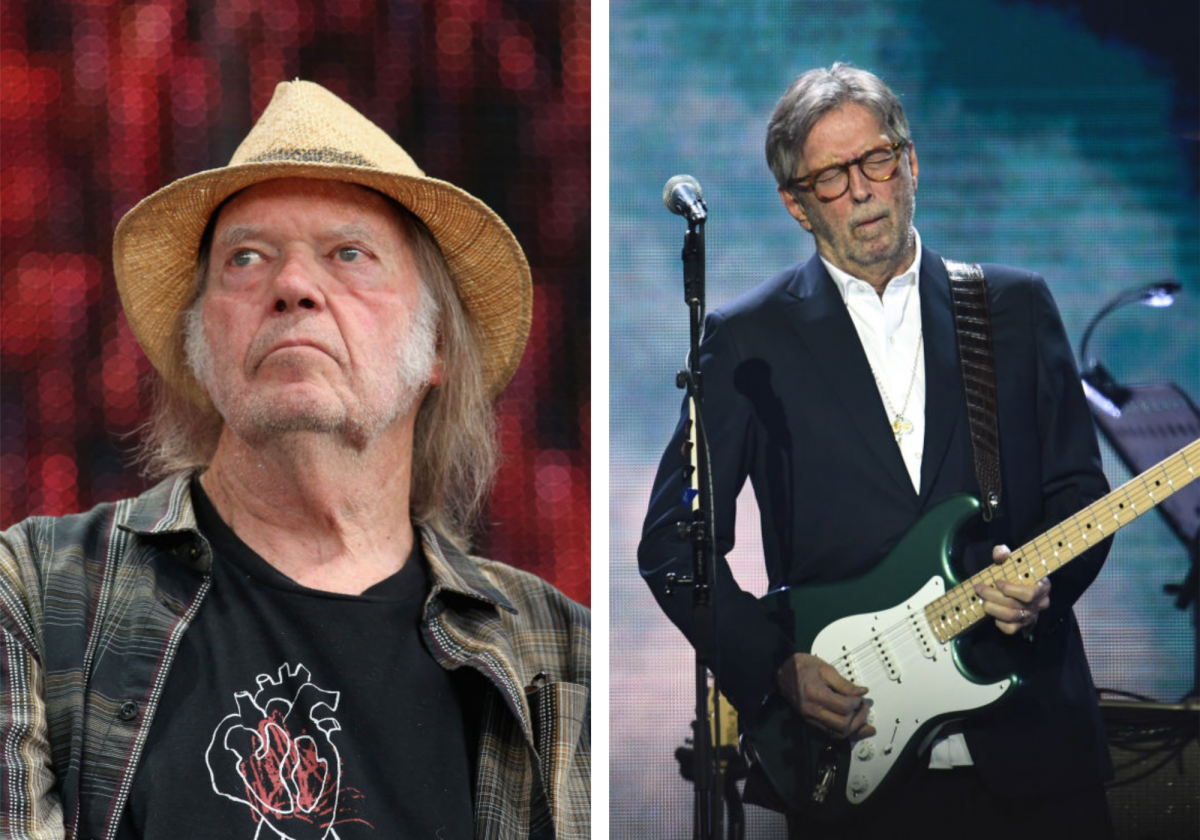Rock legends Eric Clapton and Neil Young seem unable to agree on the benefit of the COVID-19 vaccine. While Clapton has been a vocal anti-vaxxer, Young just recently posted—then deleted—a letter on his website demanding that his music be removed from Spotify over vaccine misinformation.
In an open letter to his management team on Monday, Young wrote that he wanted "to let Spotify know immediately TODAY that I want all my music off their platform," according to multiple news outlets. Young cited COVID-19 vaccine misinformation promoted by Joe Rogan, host of the streaming platform's popular podcast, The Joe Rogan Experience (JRE).
"I am doing this because Spotify is spreading fake information about vaccines – potentially causing death to those who believe the disinformation being spread by them," Young reportedly wrote. "Please act on this immediately today and keep me informed of the time schedule."
Weeks earlier, a group of 270 doctors, nurses, scientists and educators penned their own open letter to Spotify. The group demanded that the platform establish a COVID-19 misinformation policy and stop promoting dubious virus-related claims from Rogan.
"With an estimated 11 million listeners per episode, JRE, which is hosted exclusively on Spotify, is the world's largest podcast and has tremendous influence," the letter reads. "Though Spotify has a responsibility to mitigate the spread of misinformation on its platform, the company presently has no misinformation policy."

Clapton offered a far different opinion during an interview uploaded to an anti-vaccination and classic rock-focused YouTube channel on Friday. The famed guitarist, who previously denounced what he described as pro-vaccine "propaganda" in a letter last year, claimed that "mass hypnosis" explained trust in vaccines.
Clapton said that he did not understand why his family and friends were "scared" by his COVID-19 views before he received a "memo" informing him that others had been hypnotized into believing the scientific consensus using methods like "subliminal advertising" on YouTube.
"I thought ... what's going on here?" Clapton said. "I didn't get the memo. Whatever the memo was, it hadn't reached me. Then I stopped and realized there was really a memo. That guy, Mattias Desmet, talked about it and it's great. You know, the theory of mass hypnosis formation he calls it. And I could see it then, once I kind of started to look for it, I saw it everywhere."
"Then I remembered seeing little things on YouTube, which were like subliminal advertising," he continued. "It's been going on for a long time ... bit by bit, I put a rough kind of jigsaw puzzle together. And that made me even more resolute."
Clapton was referring to the theory of "mass formation psychosis," which has become popular among anti-vaccine activists since Dr. Robert Malone promoted it during a JRE podcast interview late last month.
Although Malone wrote an important early paper on the mRNA vaccine platform, he had no involvement in the development of the COVID-19 vaccines and his recent comments are not in sync with most researchers or the scientific consensus on the vaccines.
The safety and efficacy of the vaccines are backed up by research and data that are not dependent on any kind of hypnosis or psychosis. However, Desmet's mass formation psychosis theory does not appear to be backed by credible evidence.
The theory was recently discredited by multiple experts and researchers cited in a fact- checking article from the Associated Press. John Drury, a social psychologist at the U.K.'s University of Sussex, told the outlet that "no respectable psychologist agrees with these ideas."
Clapton also received backlash after releasing a song titled "Stand and Deliver" alongside Van Morrison in 2020. The song slammed the U.K. government's lockdown restrictions as attacks on personal freedoms and compared following the public health measures to willingly being "a slave."
Criticism of the song resulted in the resurfacing of past controversies involving Clapton, including a 1976 concert where he made racist comments and urged the crowd to "keep Britain white."
Newsweek reached out to Clapton's representative and Spotify for comment.
Uncommon Knowledge
Newsweek is committed to challenging conventional wisdom and finding connections in the search for common ground.
Newsweek is committed to challenging conventional wisdom and finding connections in the search for common ground.
About the writer
Aila Slisco is a Newsweek night reporter based in New York. Her focus is on reporting national politics, where she ... Read more
To read how Newsweek uses AI as a newsroom tool, Click here.








